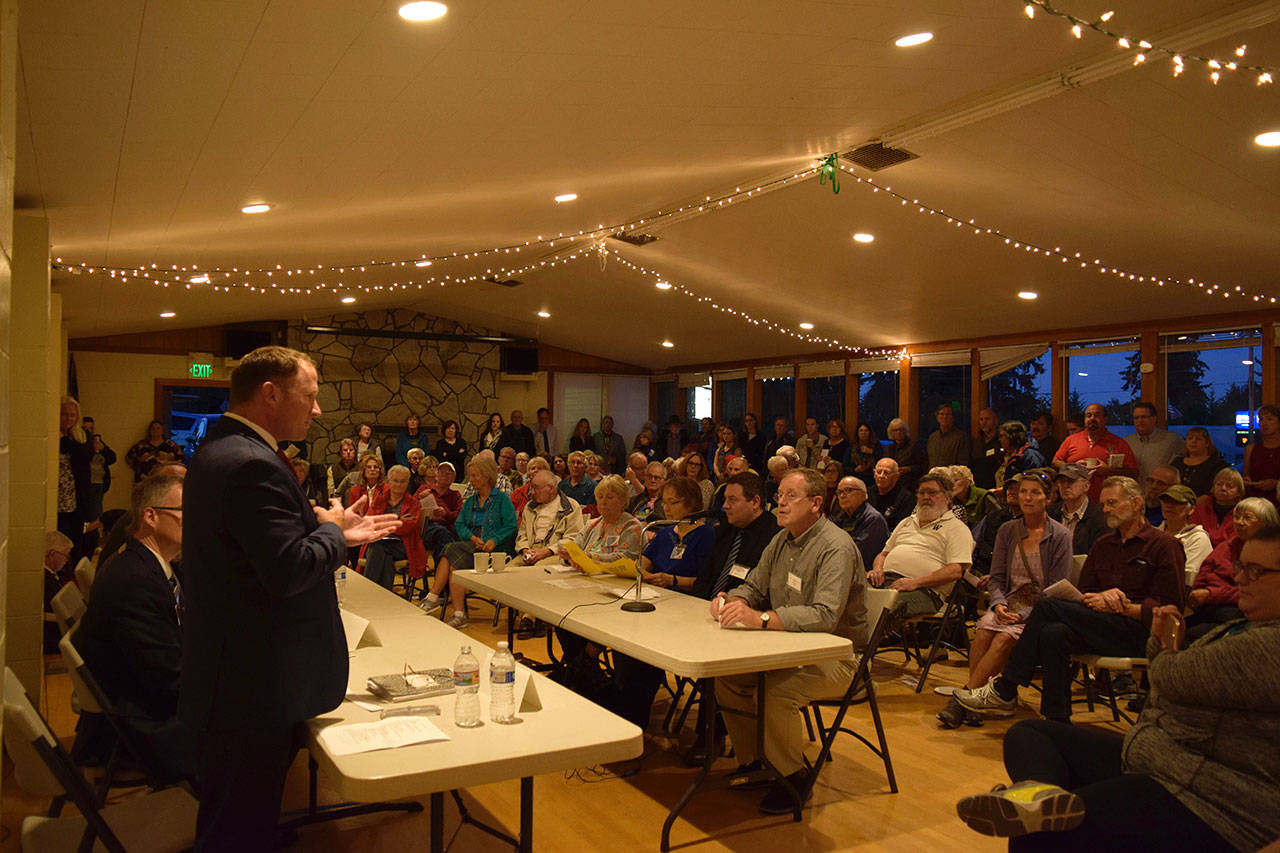Voter turnout was a welcome surprise Monday evening at a candidate forum hosted by the Clinton Community Council and the League of Women Voters of Whidbey Island.
Nearly 200 people packed Clinton Community Hall with people standing and sitting on the floor for the two-hour presentation after seats quickly filled up.
“We set up 88 chairs, I know that,” said Christina Swan, council secretary. “There’s probably just as many people standing. We really didn’t expect such a turnout. People really wanted information from the candidates.”
Two more forums sponsored by the League of Women Voters are planned Oct. 2 in Freeland and Oct. 4 in Oak Harbor.
Answering predetermined questions from a panel, each candidate was given an alternating 60 to 90 seconds to respond. They were told to stop talking when a bell sounded, and a yellow “Stop” sign waved.
Most did. But there were some violations of verbosity.
Doug Hofius, council president, welcomed the standing room only crowd to the “living room of Clinton” and explained forum rules.
“We want to keep the forum non-partisan and fair but we also want to address all the issues,” he said. Each set of candidates faced eight questions, many of them revolving around drug addiction, housing needs, homelessness, climate change, economic development for Clinton and transportation issues.
Candidates running for Island County commissioner, District 3, which is northern Whidbey and Camano Island, squared off first.
Asked about what happened to funding for the most southern portion of the Boat to Bridge Trail, from Clinton to Ken’s Corner, incumbent Rick Hannold explained why he and Jill Johnson voted to divert the funds elsewhere.
“We didn’t see any sense to it,” he said. “The trail is (designed to be) on the opposite side of the road from the connecting trail. The fact is, it’s all uphill. Just because the federal government is going to give you money doesn’t mean we have to spend it. It’s still our tax dollars.”
Challenger Janet St. Clair said she didn’t agree with the decision, saying the county walked away from money on the table that had been promised to South Whidbey residents for years and put it toward “unspecified projects elsewhere.”
In closing remarks, candidates presented main points about why they’re seeking office.
St. Clair said she’s tired of the in-fighting the three-person board of commissioners, and that she wanted to help families thrive and protect the natural beauty of the islands.
Calling himself a conservative, Hannold said he and St. Clair had similar solutions but “it’s just a difference in the way I see in how to run a rural county, which is with limited government.”
The two men vying to be Island County sheriff, replacing Mark Brown, who is retiring, both agreed the department is losing qualified deputies to better-paying positions elsewhere.
But Rick Felici and Lane Campbell differed on approaches on how best to tackle narcotics.
Several times, Campbell advocated for a canine unit to sniff out drugs, saying it would make a difference.
“The dog is a huge priority for me, for us and our future,” he concluded.
Felici responded that if the solution to drug abuse and illegal narcotic sales was dogs, “every (law enforcement agency) would have 30 dogs.” He said he favored a three-prong approach of education, treatment and enforcement.
The four candidates running for two state representative positions ended the evening talking about a diverse range of topics, including education funding, ferry service, help for the mentally ill and a fossil-fuel free future.
Rep. Norma Smith, a Clinton resident and Republican, is up against challenger Scott McMullen, a firefighter, military veteran and father of eight who lives in Mount Vernon.
McMullen often referred to following the principles and integrity set by his late father, former state Sen. Pat McMullen.
“My father was the best in reaching across the aisle so I have someone to emulate,” McMullen said when the candidates were asked about bi-partisanship. Smith touted many legislative bills that she’d ushered through with help from both parties, including data privacy and net neutrality.
Rep. Dave Hayes, a Republican representing District 10, Position 2, faced off against Dave Paul of Oak Harbor, a Democrat with experience in education and nonprofit foundations.
Calling themselves the “two Daves” they also gave strong answers to the subject of bipartisanship.
Hayes said he always tries to talk with the people affected by issues, as well as his colleagues with differing political views.
“If you don’t reach out across the aisle and to the stakeholders, you won’t be fully addressing the issue,” Hayes said.
Paul called the issue “the biggest reason I’m in this race.” He said a Republican friend told him he’d vote for him because ‘you’re moderate, even-tempered and you’ll listen to anyone.’
“I’ve already knocked on 1,300 doors, listening,” Paul said.



